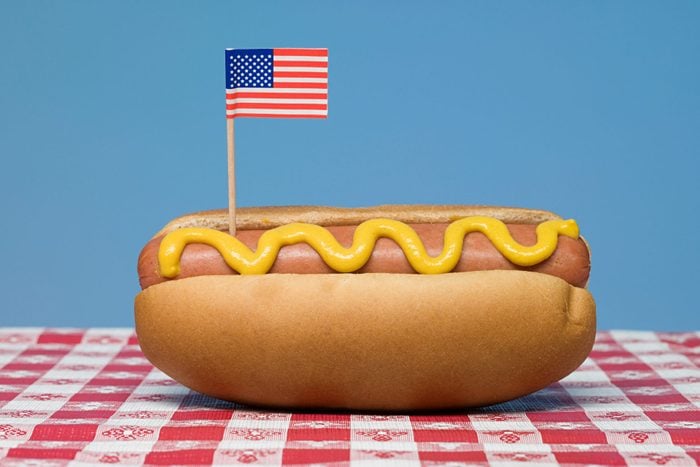
The 4th of July is about celebrating freedom…but as a cardiologist, I’d suggest that’s not an invite to make a free-for-all of the BBQ buffet line. A cookout can make it tempting to fill your plate with picnic favorites that aren’t so dynamite for your heart health.
As the founder of Step One Foods—a food-as-medicine brand clinically shown to lower cholesterol—here are the five foods I recommend you should avoid this 4th of July, and the healthy alternatives you can reach for instead.
5 Diet Changes You Should Make This Summer, from a Nutritionist
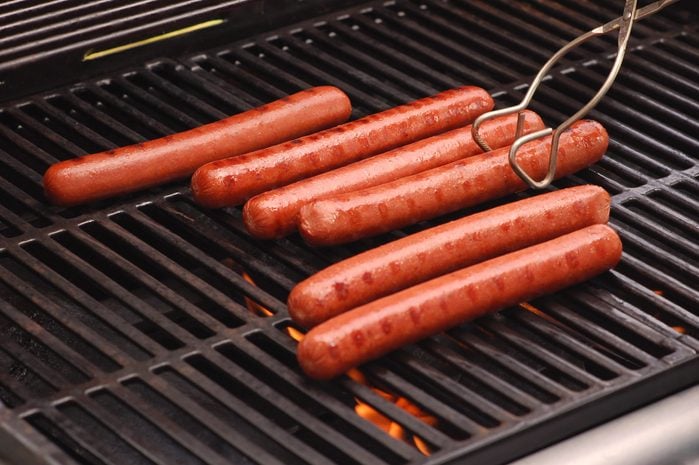
1. Brats and hot dogs
High in saturated fat and sodium—and cooked on a grill—these processed meats can raise your LDL (bad) cholesterol, raise blood pressure, and increase levels of inflammatory markers within minutes to hours from when you eating them. Plus, the World Health Organization classifies processed meats as Class 1 carcinogens. The char that develops through the grilling process only adds to that cancer risk.
What to eat instead: Substitute unprocessed meat. Marinate some chicken breasts or grill small steaks instead. It’s still not perfect, but at least you control the sodium and can cut off excess fat and skin. Also remember that portions matter. Fill your plate with salad or other vegetables and go with a more petite serving of meat.
The 5 Healthiest Concession Stand Foods, According to a Certified Nutrition Coach

2. Excess alcohol
Aside from the empty calories, excess consumption of alcohol can trigger heart arrhythmias. This even has its own name: “Holiday heart syndrome,” which refers to the development of atrial fibrillation the day of, or the day after, higher-than-usual alcohol intake.
What to eat instead: Avoiding alcohol altogether is healthiest, but even alternating every alcoholic beverage with a glass of water or sparkling water will go a long way to reducing how much alcohol you consume.
This Is the Alcoholic Drink That’s Least Harmful to Your Liver, Says a Liver Doctor
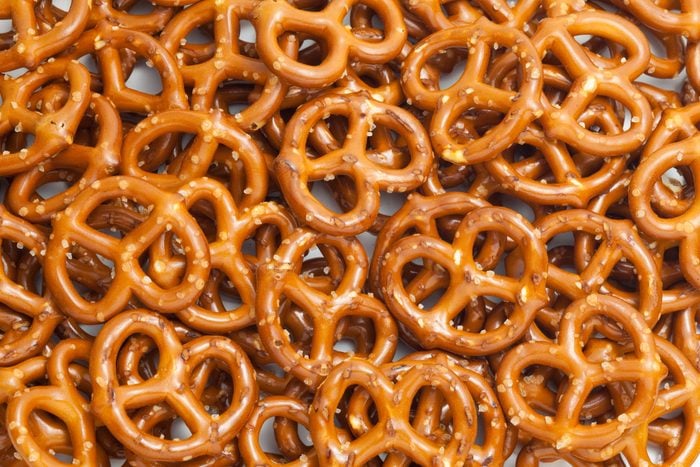
3. Pretzels
Low in fat, these seem like the better snack choice—but they’re not much better than traditional chips (which shouldn’t be eaten with wild abandon, either). Here’s why: Made with white flour, the carb content of pretzels is very easily digested and absorbed, driving elevated blood sugar readings and higher insulin levels, which in turn drive cholesterol abnormalities. Furthermore, they’re a highly efficient delivery vehicle for sodium, leading to fluid retention and higher blood pressure readings.
What to eat instead: Vegetable sticks with hummus is a great substitute. Raw carrots, cucumbers, peppers, radishes, celery, zucchini, snap peas and broccoli or cauliflower would work here. Pretty to look at, filling and easy to assemble ahead of time, it’s the perfect pre-meal snack, especially for a crowd.

4. S’mores
Other than the fact that they’re delicious, there are very few redeeming qualities about these treats. It’s as if they were purposely designed to increase blood sugar, inflammatory markers, and cholesterol levels.
Marshmallows are pure sugar, the milk in the milk chocolate negates any heart-healthy properties of the chocolate itself, and the graham crackers, though partially made with whole grain flour, supply almost no fiber.
What to eat instead: Fruit-based desserts would be a better choice. Fresh strawberries tossed with a bit of sugar and fresh blueberries tossed with a bit of sugar, lemon juice and cinnamon served with a little whipped cream are not only delicious, full of fiber and antioxidants, but also check the red, white, and blue box!
This Natural Sweetener May Lower Cholesterol and Blood Sugar, New Study Says
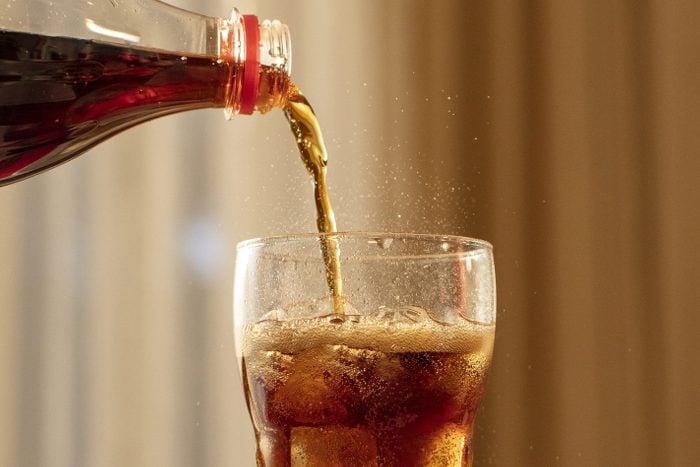
5. Soda (regular or diet)
Regular soda supplies a lot of empty calories, which doesn’t help our waistlines or blood sugar control. But you may be surprised to learn that diet soda has more complex effects that lead to the same end-result. The non-nutritive sweeteners in diet beverages have an adverse effect on our gut microbiome leading to reduced levels of circulating GLP-1.
GLP-1 is important because it increases satiety and insulin sensitivity after food intake, which means any compound that reduces the amounts of this in our circulation will leave us hungrier longer and with higher blood sugar elevations in response to anything we eat. In sum, you might be surprised to learn that regularly drinking diet soda can make you gain weight and set yourself up for prediabetes or diabetes. (By the way, those blockbuster drugs—Ozempic and Wegovy—used for diabetes and weight management work by mimicking the action of GLP-1.)
What to eat instead: Reach for regular or bubbly water instead.
The 3 Best Hydrating Beverages That Aren’t Water, from a Certified Sports Dietitian
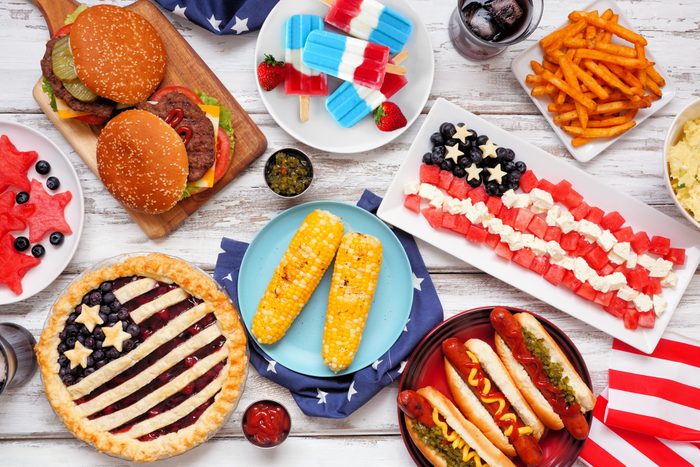
More heart-healthy tips for 4th of July food prep
- Skipping the butter on your corn-on-the-cob is great advice. Corn doesn’t need extra fat to taste amazing, especially this time of the year.
- Make your coleslaw without mayo. A dressing made with apple cider vinegar, olive oil, a little maple syrup or honey and celery seed is not only healthier and refreshing, but doesn’t compromise on taste.
- Avoid creamy dressings on other salads and vegetables, as well. A great trick is to use some lemon-infused olive oil on your veggies and greens—makes everything taste better!
- Reduce the negative consequences of the meat components. For burgers, for example, don’t even offer cheese and bacon toppings, but add flavor to the meat instead. Think garlic, onion, herbs and other spices.
- Use whole wheat buns instead of white. The higher the whole grain content, the better.
- If you’re serving white wine, make it into a spritzer by splashing in some plain-flavored, carbonated water.